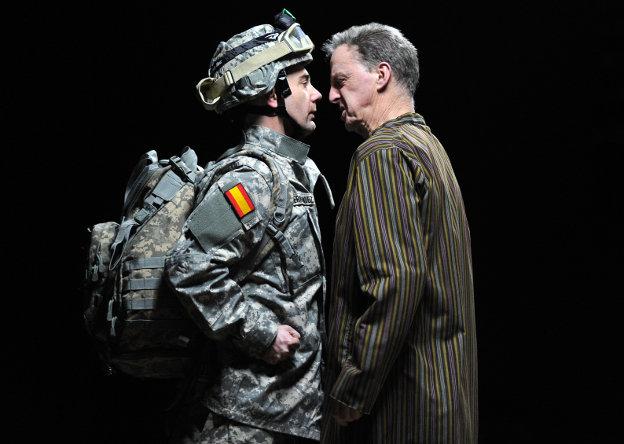Violence and symmetry are on the cards in Robert Lepage’s highly constructed Spades. It’s the first in a quartet of pieces, and the mind boggles as to how hearts, diamonds or even clubs could follow suit.
Spades is set in Las Vegas in 2003. The gambling revolves around not only casinos, but also the invasion of Iraq, a shotgun wedding and more entrenched problems like suicide, miscarriage or economic migration.
The characters caught in this net range from a Latino maid in drag (called Concepción, with bitter irony) to the slippery, mercurial TV producer Mark Turnbridge (played to perfection by Tony Guilfoyle). Along the way, there’s a charismatic preacher Elvis, naïve newlyweds, Danish and Spanish soldiers, a dominatrix (created with feisty physicality by Nuria Garcia) and a husky devil (aka Dick).
The spatial design is striking, and the set operates on different levels. Bar scenes show characters from the torso upwards only but with live filming on small screens; the stage is hollowed out to be a steamy pool, doors collapse horizontally, neon signs seem embedded in the audience on all four sides. And there are brilliant details, such as drinks that light up when spiked ice cubes are added.
It’s tempting to compare this to a Rubik’s cube, with pieces slotting into place horizontally and vertically. But the programme notes emphasise how the director is also working in 360 degrees, to give a spherical effect. By the time the fourth wall is so overtly broken in the final line, it’s arguable whether such a wall existed at all.
Perhaps it is the lethal cocktail of addiction, decadence, rape and termination that leave you longing for a sort of order. If only this conundrum could be solved like a children’s puzzle… or the Bible counted like cards, as the proselytising King suggests. Instead, you are craning to see a bit more cruelty, mesmerised by the number $1,032,155 or impatient to win.
The narrative is fractured, with short scenes interspersed, but the vignettes do make up a wider picture. We follow people through x-rays, chapels, reception, room 3426 and gamblers’ anonymous, even if this is not too narrowly linear. The strands of the story ultimately come together, as Mark’s gambling winnings are diverted by Concepción’s manager (for a diagnosis of early menopause), after a platitude from the receptionist sends him deep into the desert…
Spades can also leave you cold, however. The acting is virtuoso, with six players (seven crew) who flip between varied roles. On one level, it’s not hard to make connections if you’ve encountered money, desire or even breathing, but there is still something persistently analytical, almost clinical in the depiction. Like a traditional tragedy, the violence is upfront, but depth, texture and surprises follow.
Legendary Canadian theatre-maker Robert Lepage gave a radio interview the same morning. In the context of the Iraq war anniversary, and crusades against Islam, he argued that, paradoxically, Vegas grew around an Arabic culture of storytelling and poetry. (Spades itself is both culturally/linguistically rich and not above stereotype – with Scandinavian crusaders or the German bellboy who insists on fixing the phones just as the room occupants get in flagrante delecto). Lepage also let slip that he shocks critics by paying attention to reviews, and making alterations in response. So there’s no conclusion for Spades, only a work in progress.


